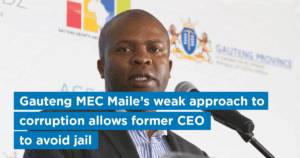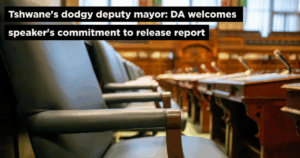The Democratic Alliance (DA) in Johannesburg is sounding the alarm on a full-blown Development Planning governance crisis that results directly from the City’s culture of administrative neglect.
The system paralysis, caused by the City’s failure to pay the service provider, has not ended; it has merely evolved into a severe, unacceptable operational backlog that now poses an existential threat to property investment and revenue collection.
The Land Information System (LIS), the backbone of property management, valuations, town planning applications, and rates accounts, was allowed to fail due to non-payment.
While the system has recently been restored to functionality, the City’s initial negligence has resulted in an administrative bottleneck that is every bit as devastating as the downtime itself.
The weeks of LIS downtime have translated directly into a collapse of critical administrative workflows, creating an unjustifiable backlog:
- System Paralysis Transferred: Workflows across Planning and Finance were frozen, and this paralysis has now accumulated into a severe backlog of applications and transactions.
- Developers Halted: Town planning applications, which could not progress beyond the circulation stage, face crippling delays, undermining investment and job creation in the sector.
- The Most Severe and Unjust Impact: The backlog falls squarely on Johannesburg’s newest homeowners. Because the City failed to maintain LIS functionality, the backlog now prevents the opening of new municipal rates accounts.
- Impossible Situation Perpetuated: Residents who have lawfully taken transfer are still unable to register accounts or pay their rates, yet the administration continues to act as though everything is normal, threatening these same residents with cut-offs and punitive action for accounts they were never able to open.
This is an indefensible governance failure. LIS is not a luxury; it is the foundation of lawful administration. At present, that foundation is buried under a backlog of the City’s own making.
The DA demands immediate intervention to address both the underlying administrative failure and the resulting crisis. We will formally write to senior officials with the following immediate demands:
The Group Chief Financial Officer (GCFO) must:
- Explain the Root Cause of Non-Payment: Provide a comprehensive account detailing precisely why the service provider was not paid, who has been held accountable, and what disciplinary action has been implemented.
- Halt Punitive Actions: Implement an urgent directive to suspend all disconnections and punitive actions against residents affected by the LIS downtime and current backlog.
The Group Head of GICT must:
- Provide a Clear Recovery Plan: Present a detailed, resource-allocated plan to eliminate the accumulated backlog.
- Account for the Delay: Publicly commit to a specific, dated target for when the LIS-related backlog will be fully resolved and normal processing times will be restored.
The City Manager must:
- Intervene Directly: Intervene directly to break the administrative deadlock and ensure the accumulated backlog is treated as an emergency priority.
- Ensure Future Stability: Resolve the underlying financial dispute and provide a guarantee that the City will not allow a critical system to fail due to administrative negligence again.
The DA will continue to apply pressure until this crisis is resolved, the backlog is cleared, and accountability is established for the administrative failures that led to the collapse of Johannesburg’s critical property systems.








